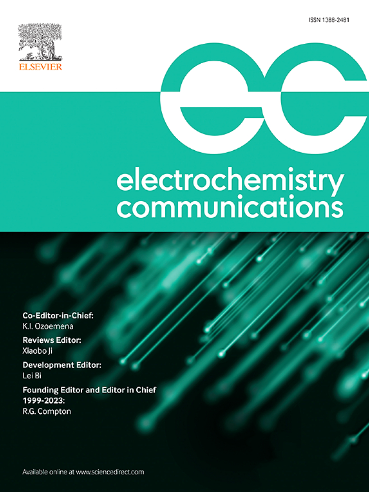探索微生物燃料电池的操作障碍:提高废水的能量回收
IF 4.2
3区 工程技术
Q2 ELECTROCHEMISTRY
引用次数: 0
摘要
在环境危机中,为了应对全球对更有效的能源和水管理的需求,废水不仅被视为废物,而且越来越被视为可再生能源的潜在来源。微生物燃料电池处于这一转变的前沿,能够通过发电细菌的活动直接将废水中的有机基质转化为电能。本文全面回顾了微生物燃料电池技术在过去二十年中的进展,重点介绍了系统设计、材料选择和操作效率方面的改进,这些改进降低了成本,提高了能源效率。它考察了微生物燃料电池性能最大化的关键因素,包括内阻、溶解氧、电导率、有机负载率和最佳条件,如温度(20-35°C)和pH(6.3-7.8)。尽管取得了重大的技术进步,但仍存在一些阻碍微生物燃料电池广泛商业应用的障碍,包括高投资成本和有限的可扩展性。解决这些挑战对于实现微生物燃料电池在可持续废水管理中的全部潜力至关重要。这篇综述强调了影响微生物燃料电池效率的关键操作参数,提出了克服现有限制和提高能量回收过程的策略。本文章由计算机程序翻译,如有差异,请以英文原文为准。

Exploring operational barriers in microbial fuel cells: Enhancing energy recovery from wastewater
In response to global demands for more efficient energy and water management amidst environmental crises, wastewater is increasingly valued not just as a waste product but as a potential source of renewable energy. Microbial Fuel Cells are at the forefront of this transformation, capable of directly converting organic substrates found in wastewater into electrical energy through the activity of electrogenic bacteria. This paper provides a comprehensive review of advancements over the past two decades in Microbial Fuel Cell technology, focusing on improvements in system design, material selection, and operational efficacy that reduce costs and enhance energy efficiency. It examines key factors including internal resistance, dissolved oxygen, conductivity, organic loading rate, and optimal conditions such as temperature (20–35 °C) and pH (6.3–7.8) in maximizing the performance of Microbial Fuel Cells. Despite significant technological advances, several barriers remain that prevent the widespread commercial application of Microbial Fuel Cells, including high investment costs and limited scalability. Addressing these challenges is crucial for realizing the full potential of Microbial Fuel Cells in sustainable wastewater management. This review underscores the critical operational parameters that influence Microbial Fuel Cell efficiency, proposing strategies to overcome existing limitations and enhance the energy recovery process.
求助全文
通过发布文献求助,成功后即可免费获取论文全文。
去求助
来源期刊

Electrochemistry Communications
工程技术-电化学
CiteScore
8.50
自引率
3.70%
发文量
160
审稿时长
1.2 months
期刊介绍:
Electrochemistry Communications is an open access journal providing fast dissemination of short communications, full communications and mini reviews covering the whole field of electrochemistry which merit urgent publication. Short communications are limited to a maximum of 20,000 characters (including spaces) while full communications and mini reviews are limited to 25,000 characters (including spaces). Supplementary information is permitted for full communications and mini reviews but not for short communications. We aim to be the fastest journal in electrochemistry for these types of papers.
 求助内容:
求助内容: 应助结果提醒方式:
应助结果提醒方式:


